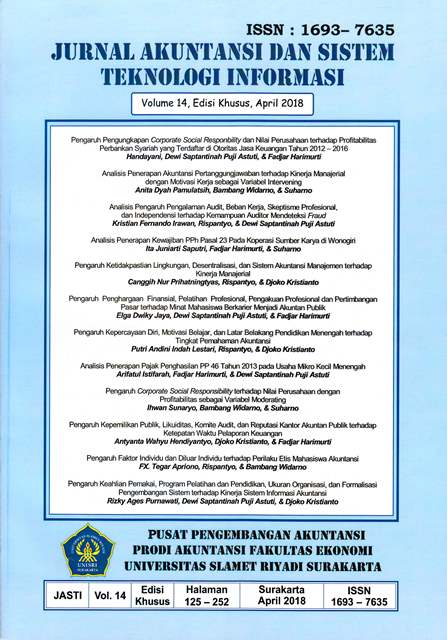ANALISIS PENGARUH PENGALAMAN AUDIT, BEBAN KERJA, SKEPTISME PROFESIONAL, DAN INDEPENDENSI TERHADAP KEMAMPUAN AUDITOR MENDETEKSI FRAUD
Abstract
This study tested the influence of audit experience, workload, skepticism, and professional independence against the ability of Auditors to detect fraud. This study used a survey of studies on public accounting Auditors on the city of Surakarta and Yogyakarta. The data type used is qualitative data and quantitative data, the source data used the primary data. The population in this research is the auditor who worked in public accounting in the region of Surakarta and Yogyakarta as much as 133 respondents. The sample in this research are all members of the population taken as a sample of the research, based on the number of questionnaires returned. The research sample is determined by random sampling techniques. Technique of data analysis used a classic assumption test, and multiple linear regression analysis. The results of the analysis of the data shows that: (1) auditing experience a positive effect against the ability of Auditors to detect fraud, (2) the negative effect of the workload against the ability of Auditors to detect fraud, (3) positive influential professional skepticism against the ability of Auditors to detect fraud, (4) a positive effect against the independence of the auditor's ability to detect fraud.Keywords: fraud, audit experience, workload, skepticism, independence.
Downloads
Published
2019-01-30
Issue
Section
Artikel
License
Authors who publish this journal agree to the following terms:
- Authors retain copyright and grant the journal right of first publication with the work simultaneously licensed under a Creative Commons Attribution License that allows others to share the work with an acknowledgement of the work's authorship and initial publication in this journal.
- Authors can separately make additional contractual arrangements for non-exclusive distribution published by the journal (e.g., publish it in a book), with an acknowledgement of its initial publication in this journal.
- Authors are allowed and encouraged to send their work via online (e.g., in the institutional repositories or their website) after published by the journal.










